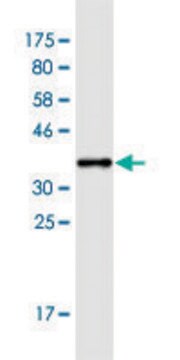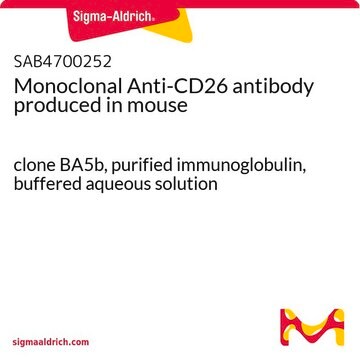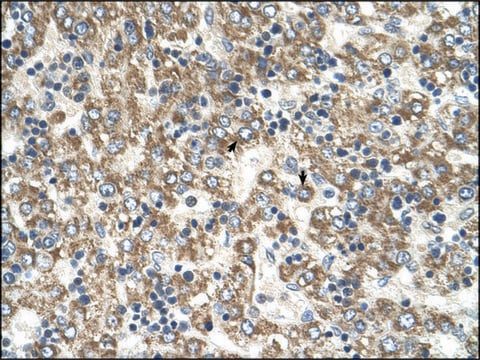MABS2291
Anti-DPP4/CD26 Antibody, clone KU44.13A
About This Item
Prodotti consigliati
Origine biologica
mouse
Livello qualitativo
Coniugato
unconjugated
Forma dell’anticorpo
purified antibody
Tipo di anticorpo
primary antibodies
Clone
KU44.13A, monoclonal
PM
calculated mol wt 88.28 kDa
Purificato mediante
using protein G
Reattività contro le specie
human
Confezionamento
antibody small pack of 100 μL
tecniche
ELISA: suitable
flow cytometry: suitable
immunofluorescence: suitable
immunohistochemistry (formalin-fixed, paraffin-embedded sections): suitable
immunoprecipitation (IP): suitable
Isotipo
IgG2κ
Sequenza dell’epitopo
Extracellular domain
N° accesso ID proteina
N° accesso UniProt
Condizioni di spedizione
2-8°C
modifica post-traduzionali bersaglio
unmodified
Descrizione generale
Specificità
Immunogeno
Applicazioni
Evaluated by Flow Cytometry in HPAF-II cells.
Flow Cytometry Analysis: 1 μg of this antibody detected DPP4/CD26 in one million HPAF-II cells.
Tested Applications
Immunofluorescence Analysis: A representative lot detected DPP4/CD26 in Immunofluorescence applications (Arias-Pinilla, G.A., et al. (2020). Sci Rep. 10(1):537).
Immunoprecipitation Analysis: A representative lot immunoprecipitated DPP4/CD26 in Immunoprecipitation applications (Arias-Pinilla, G.A., et al. (2020). Sci Rep.10(1):537).
ELISA Analysis: A representative lot detected DPP4/CD26 in ELISA applications (Arias-Pinilla, G.A., et al. (2020). Sci Rep. 10(1):537).
Flow Cytometry Analysis: A representative lot detected DPP4/CD26 in Flow Cytometry applications (Arias-Pinilla, G.A., et al. (2020). Sci Rep. 10(1):537).
Immunohistochemistry Applications: A representative lot detected DPP4/CD26 in Immunohistochemistry applications (Arias-Pinilla, G.A., et al. (2020). Sci Rep. 10(1):537).
Note: Actual optimal working dilutions must be determined by end user as specimens, and experimental conditions may vary with the end user
Stato fisico
Stoccaggio e stabilità
Altre note
Esclusione di responsabilità
Not finding the right product?
Try our Motore di ricerca dei prodotti.
Codice della classe di stoccaggio
12 - Non Combustible Liquids
Classe di pericolosità dell'acqua (WGK)
WGK 1
Punto d’infiammabilità (°F)
Not applicable
Punto d’infiammabilità (°C)
Not applicable
Certificati d'analisi (COA)
Cerca il Certificati d'analisi (COA) digitando il numero di lotto/batch corrispondente. I numeri di lotto o di batch sono stampati sull'etichetta dei prodotti dopo la parola ‘Lotto’ o ‘Batch’.
Possiedi già questo prodotto?
I documenti relativi ai prodotti acquistati recentemente sono disponibili nell’Archivio dei documenti.
Il team dei nostri ricercatori vanta grande esperienza in tutte le aree della ricerca quali Life Science, scienza dei materiali, sintesi chimica, cromatografia, discipline analitiche, ecc..
Contatta l'Assistenza Tecnica.








